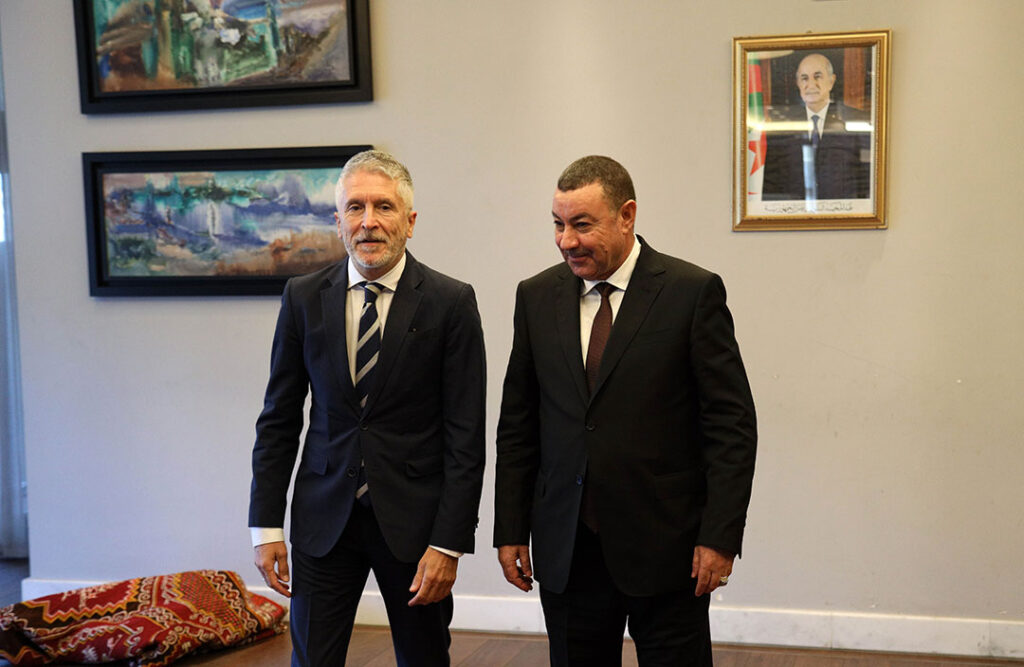Algeria and Spain announced a renewed commitment to combat shared threats. The collaboration between the two countries separated by the Mediterranean Sea will focus on battling terrorism, human trafficking and drug smuggling while enhancing cybersecurity, civil protection, road safety and disaster management.
This was announced after an October 20 meeting between Algerian Minister of Interior Said Sayoud and Spanish Interior Minister Fernando Grande-Marlaska in Algiers. Sayoud said the “fruitful” cooperation between the two countries had reached “a high level in many areas.”
“Today’s meeting is a renewed opportunity to exchange opinions and viewpoints on these serious threats, which require us to unite our efforts and work collaboratively to find sustainable solutions, in accordance with the wise visions and high directives of the senior authorities in our countries,” Sayoud said in a report by Algeria’s AL24 News channel.
Grande-Marlaska emphasized that Algeria is a key strategic partner for Spain and that the challenges faced by both nations require cooperation.
“We must continue to work together and coordinate our efforts and capabilities to confront the growing phenomenon of criminal networks, which in addition to trafficking people, putting their lives at risk, have increased their involvement in drug trafficking,” Grande-Marlaska said in a report by La Moncloa, the Spanish government’s official news outlet.
Criminal organizations for years have used powerful speedboats to traffic drugs, typically cocaine and hashish, from Algeria to Spain and vice versa. This has fueled addiction in both countries.
Sayoud and Grande-Marlaska met in Madrid a week before the Algiers meeting. There, the countries agreed to expedite the review of judicial assistance requests submitted by Algeria’s Justice Ministry regarding the recovery of assets acquired through illicit means.
According to La Moncloa, the Madrid meeting also addressed collaboration on road safety. An Algerian delegation had visited the Directorate General of Traffic in Madrid in late September to learn about traffic management in Spain, as Algeria has experienced increased road fatalities. The ministers also agreed to cooperate on civil protection and emergency management.
The ministerial meetings highlighted improved relations between the two countries. In 2022, Algeria ended all international exchange agreements and a 2-decade-old friendship treaty with Spain, while withdrawing the Algerian ambassador in Madrid. Algeria took these steps after Spain backed Morocco’s position on the disputed Western Sahara territory. Algeria had rejected Morocco’s claims to the area.
Relations between the nations began to thaw in February 2025 when Algerian Interior Minister Ibrahim Mourad visited Spain to discuss with Grande-Marlaska cooperation between relevant security agencies and institutions. A statement from the Algerian Ministry of the Interior said the meeting focused on fighting transnational crime, including the trafficking of weapons, ammunition, drugs and chemical precursors, and cyber and economic crimes.
The ministers also discussed the resumption of a security agreement in effect since 2009, which established a joint security committee serving as a bridge between Algerian intelligence and Spain’s National Intelligence Center to combat terrorism, Spanish media platform Atalayar reported.
Political analyst Juan Jose Fernandez told Spanish newspaper El Periódico that security relations between the countries never severed. According to Fernandez, a turning point in restoring relations occurred when Spanish tourist Joaquin Navarro was kidnapped in Algeria in January 2025 by criminals intending to sell him to the Islamic State group in the Greater Sahara. Navarro was freed within seven days in an operation that Spanish authorities praised as a testament to Algeria’s cooperation.

